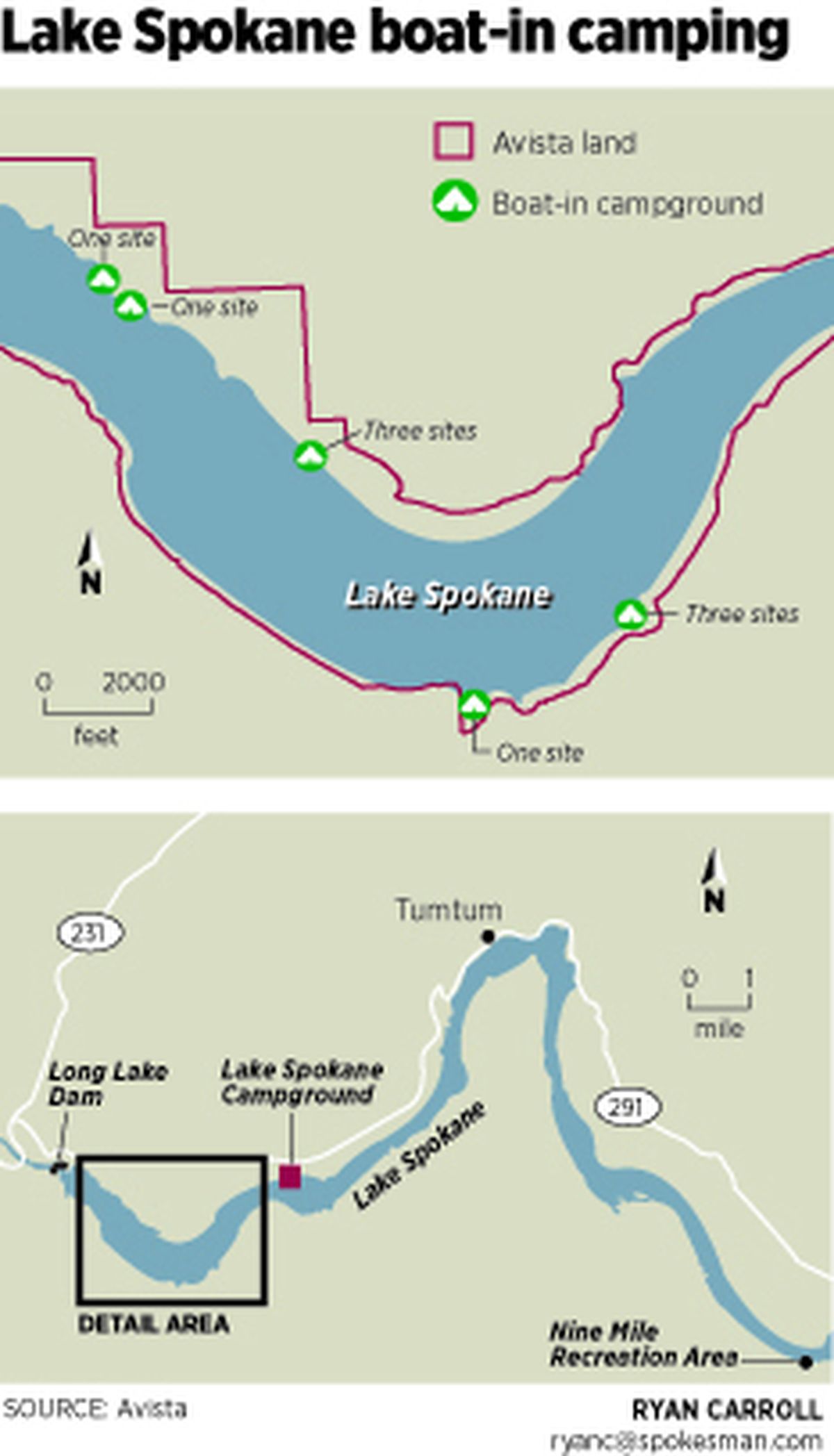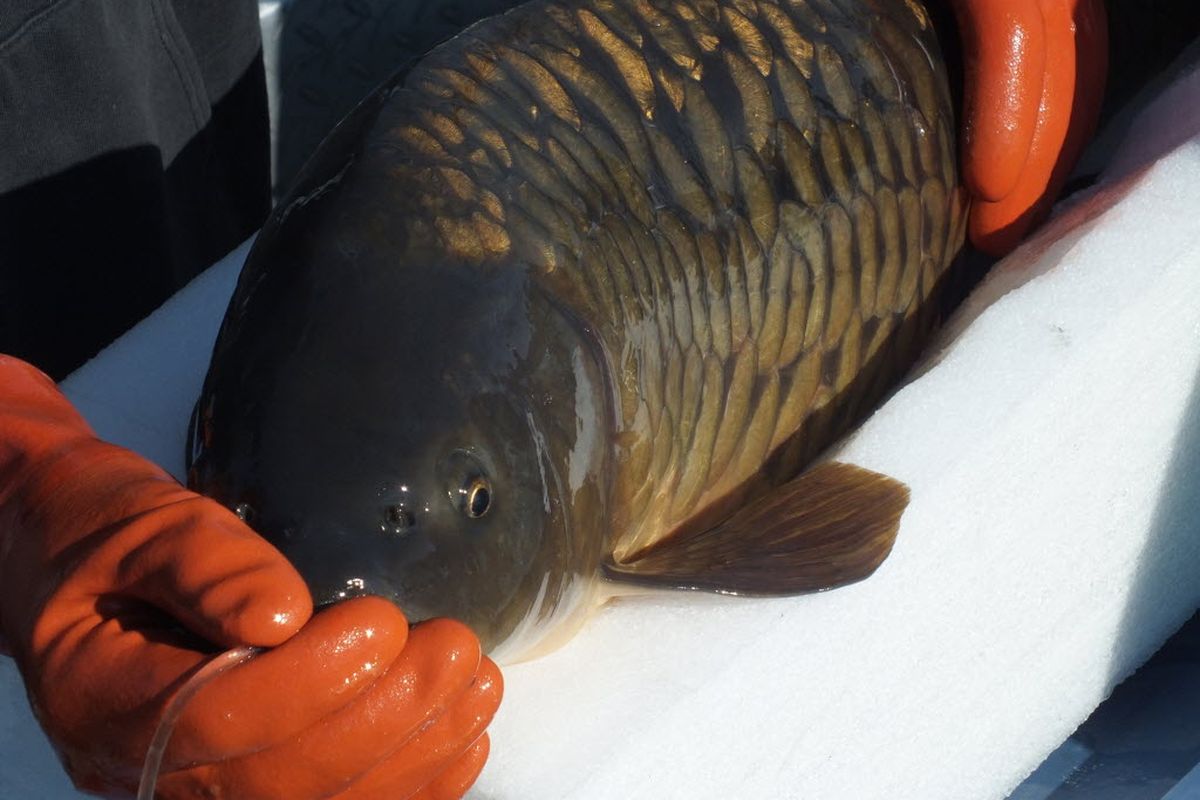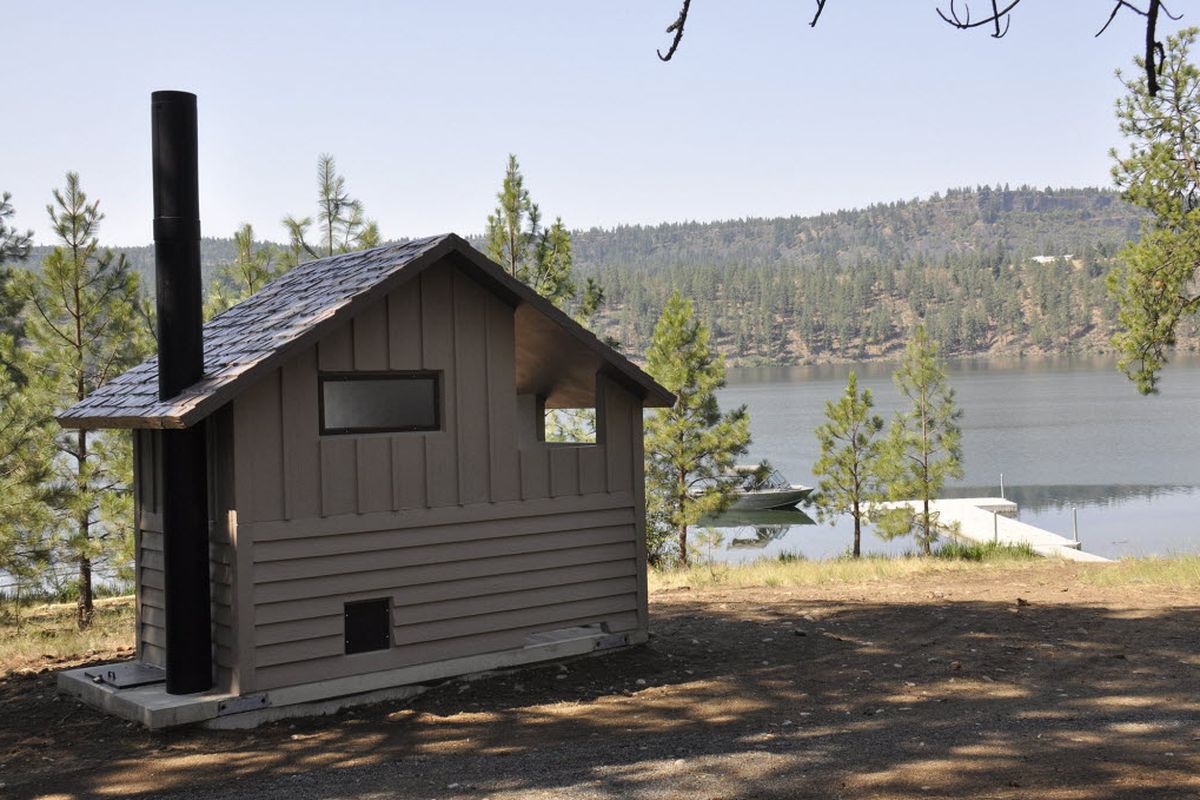Long Lake Dam pays dividends to boaters, campers, wildlife
A transmitter is implanted in a carp caught and released in Lake Spokane in spring 2014 for a fisheries study conducted by Avista. (Avista)
The 10 boat-in campsites completed this month at Lake Spokane are the most recent recreational benefits generated by the largest of six hydropower projects on the Spokane River.
Anglers, campers and water skiers as well as hundreds of lakeside households take advantage of the deep pockets of Avista Utilities, which owns the dam and the largest share of the shoreline.
Long Lake Dam dramatically alters the river for 24 miles upstream from its site at Highway 231 north of Reardan. Public access, fisheries, water quality issues, wildlife habitat and aquatic weed control are among the responsibilities Avista assumes for permission to impound the river and sell the resulting electrical power.
“The dam slows the water. It’s no longer free-flowing. We’re responsible for that,” said Speed Fitzhugh, Avista’s Spokane River license manager.
For seven years he was involved in negotiations that culminated in 2009 with relicensing Spokane River dams with the Federal Energy Regulatory Commission for another 50 years.
Fulfilling FERC criteria for resources influenced by Long Lake Dam requires Avista to invest energy in programs around the reservoir.
The company plans to spend about $1 million this year for environmental and natural resource management related to Lake Spokane and Nine Mile Reservoir as part of the FERC license, said Mary Tyrie, Avista marketing manager.
“Capital improvements projects, primarily for recreation and water quality, are also budgeted at about $1 million for this year,” she said, noting that most of the FERC-required capital projects will be completed within a few years.
The company has partnered with state agencies, the Lake Spokane Association and other groups involved with the reservoir.
The most obvious public benefits involve Avista’s commitments to fund recreation projects through Washington State Parks.
In the 1980s, Avista purchased Nine Mile Resort to protect public access, said Tim Vore, the company’s Spokane River fisheries specialist. “Otherwise the site almost surely would have been subdivided and developed and closed off to public access, which is precious,” he said. Avista gave state parks a 30-year lease on the property in 2007.
The lake’s other once-thriving resorts – Forsheens and Willow Bay – have been closed to the public.
Nine Mile is popular with groups ranging from families to fishing clubs, with a launch, sandy beach, RV campground and concession that rents stand-up paddle boards and kayaks.
Riverside State Park, with help from Avista, provides the only public boating access to the reservoir through sites at Nine Mile as well as the mouth of the Little Spokane River and Lake Spokane Campground.
During a recent boat tour of the reservoir, Avista staffers pointed out that no-wake buoys installed upstream from the Nine Mile launch help protect Western grebes that incubate eggs in July. Dozens of the fish-eating waterfowl hunker in the middle of the lake on nests floating in mats of lily pads.
Avista helps monitor the grebes as well as the nesting bald eagles – up to 10 to 12 pairs along the lake in recent years.
Avista is involved in aquatic weed control with property owner groups as well as at public access sites.
The company also sponsors a shoreline rehabilitation program that helps willing property owners soften their impact.
“The way homeowners live affects water quality,” Fitzhugh said. “We try to get them to buy in, but when you boat down the lake you can see that everyone has a different idea of how to landscape.”
The program emphasizes natural vegetation buffers along the shore and eliminating as much as possible manicured lawns and all the fertilizer, pesticides and herbicides to go with them.
“That all ends up in the water to some degree, and collectively it’s significant,” Fitzhugh said.
The company works in several ways with the Lake Spokane Association, which united in 2010 after a rare water temperature change killed thousands of carp as they were spawning in shallow water. Avista donated $2,000 to the clean-up.
That big stink hasn’t been forgotten. In June, Avista captured 625 spawning carp. Most were tagged and tiny transmitters were inserted in 20 of the fish for a study on the species movements and managing oxygen levels to avoid a similar event in the future.
Farming operators along the lake have not been interested in the company’s offers to purchase their lakeside land to reduce the impacts of agricultural chemicals and fertilizers on the lake, “but we keep trying,” Fitzhugh said.
To satisfy federal dam licensing requirements, Avista purchased 54 acres of wetlands as far upstream as Sacheen Lake. “Protecting wetlands enhances water quality downstream,” he said.
W hile fishermen have long prized the lake for catches of bass and panfish, Avista paid the way for trout to make a bigger splash on the angling scene this year. About 155,000 catchable-size sterile rainbow trout were released in the lake in June.
“It’s the first year we’ve done it,” Vore said. Creel surveys are planned to see if anglers are catching enough of the fish to continue the stocking.
The complexion of the reservoir changes dramatically about halfway down and around a big bend at Tumtum. The water gets deeper, the shoreline wilder. Cell phone coverage is lost.
Our boat continued past anglers fishing along the McLellan Conservation Area, which is managed in a natural state by the Spokane County Conservation Futures Program.
Most of the shoreline in the lower half of the reservoir is owned by Avista, the Department of Natural Resources or a few large property owners. Avista, the largest landowner on the lake, wants to be a leader at protecting it, Fitzhugh said.
Avista owns 1,100 acres of uplands and about 330 acres along seven miles of shoreline on both sides of the reservoir to provide a buffer for at least 200 feet up from the water between some private properties.
“We want to protect our shoreline areas in a natural state,” Fitzhugh said, noting projects to thin timberlands for forest health and fire resistance.
“You can feel like you’re miles from anywhere in some portions of this lake,” Vore said.
A limited number of hunting access permits are issued on a first-come, first-served basis for three separate areas totaling 960 acres along the reservoir. Avista headquarters in Spokane starts offering the permits two weeks before a hunting season.
Before reaching the Lake Spokane Campground, the boat passes some eye-catching rock outcroppings on river left. The 663 acres acquired by Riverside State Park in the 1990s, including 1.8 miles of shoreline, is a prime candidate for a state park-Avista partnership to develop another campground, Fitzhugh said.
The hottest improvement to the “wild” lower end of the lake this year is the development of boat-in campgrounds.
Avista has installed docks to serve 10 boat-in campsites the company has enhanced with concrete tables, fire pits, sitting rocks, graded areas and toilets. Timber at the sites has been thinned to reduce fire hazard.
Some of the sites, such as Muley Canyon, have been used informally for years, but had become degraded by lack of facilities.
One vault toilet was damaged by fire and graffiti within a week after it was installed in July. “There are challenges to managing these lands,” Fitzhugh said.
“Some locals have used these sites for years and they don’t like the idea of more people coming here,” said René Wiley, Avista’s recreation, land use and cultural resources specialist.
The sites have been cleaned up, junk has been hauled out and gates installed to prevent vehicle access from main roads.
At the Woody Slough campsites, more than 300 willows and dogwood have been planted for shoreline habitat.
The campgrounds are being managed by the Riverside State Park.
“We have already seen a lot of use at the new sites,” Riverside State Park manager Chris Guidotti said. ”We plan to charge $12 per night once everything is completed, signed, and pay stations are in place, but that may not happen this season.
“I have a feeling we may have to go to a reservation system at some point,” he said.
Boaters who launch at Lake Spokane Campground or Nine Mile Recreation Area must pay a $10 overnight fee for leaving a vehicle and trailer when they head to a boat-in campsite.
Several other projects are on Avista’s list for the Lake Spokane area, such as:
• Developing a boat take-out just above Nine Mile Dam.
• Extending the Centennial Trail to Nine Mile Recreation Area.
• Developing a campground on the Fisk Property.
“It’s a choice piece of undeveloped land that’s being trashed and abused by partiers,” Guidotti said. “With Avista’s help, we could make it a neat place the public would appreciate and enjoy.”







